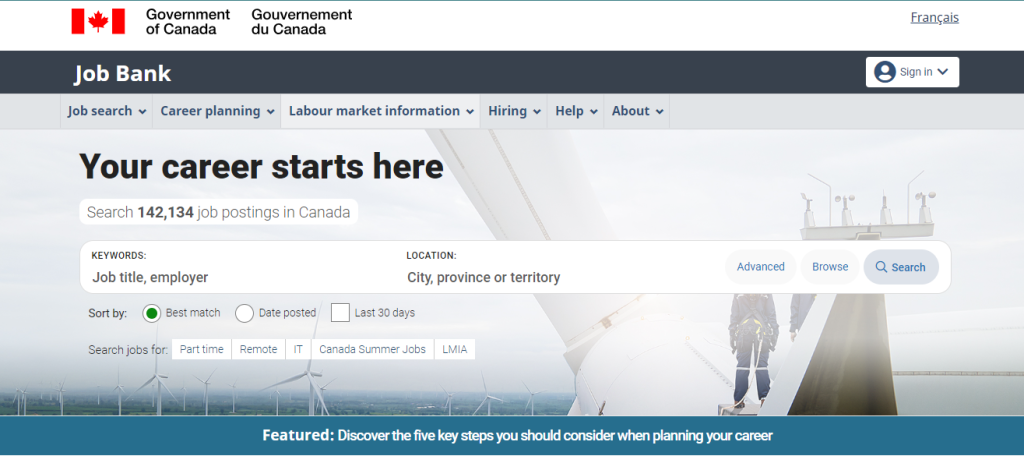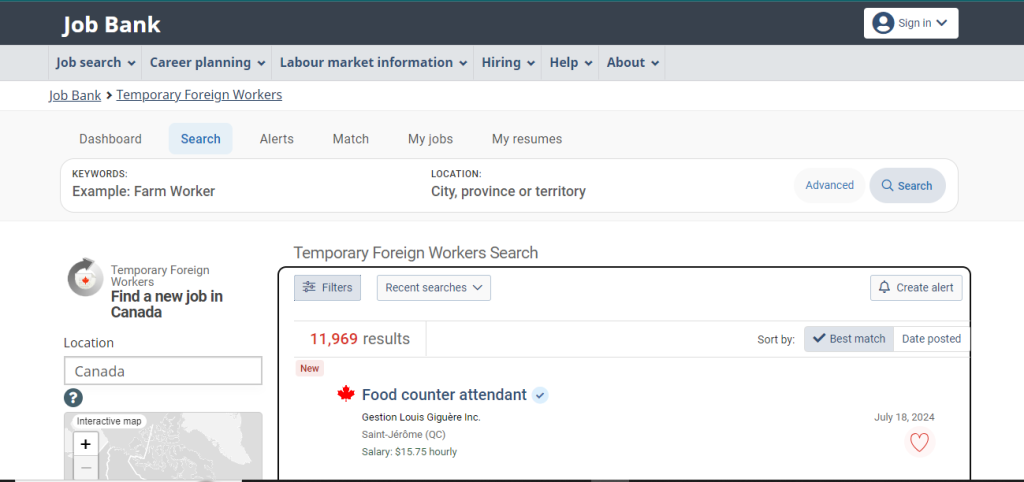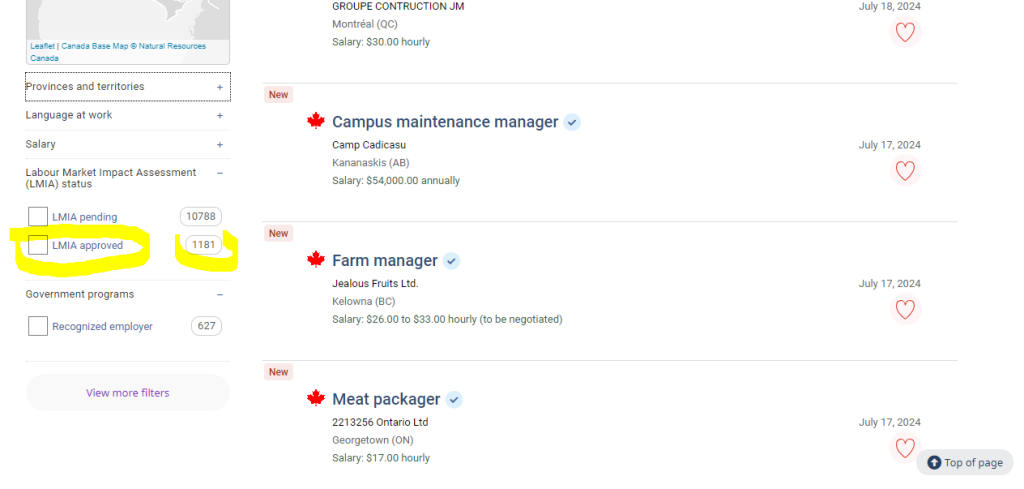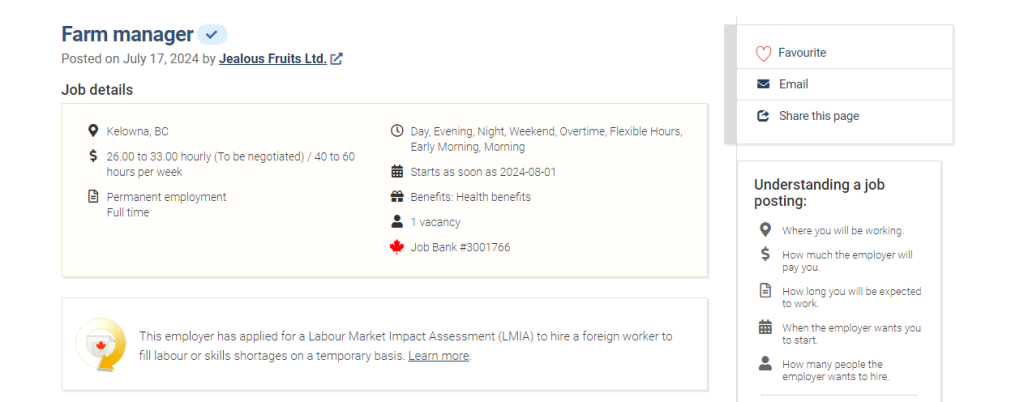Foreigners looking to work in Canada have a lot of opportunities available to them, but finding high-paying jobs can be a challenge. Canada is a welcoming country with a strong economy, and there are plenty of industries that are looking for skilled workers from around the world.
However, you need to understand the Canadian job market and the skills that are in demand before beginning your search.
One of the top industries for foreign workers in Canada is technology. The tech sector is growing rapidly, and there is a high demand for skilled workers in areas such as software development, artificial intelligence, and cybersecurity.
Other industries that are looking for skilled workers include healthcare, finance, and engineering. These industries offer a range of high-paying jobs for foreigners who have the right qualifications and experience.
However, there are other jobs called the LMIA Jobs that are very common, often non-professional, and are in demand in Canada. We will talk about them first and provide a link for you to find over 11,000 jobs (not telegram) before going deep into the jobs as mentioned earlier.
LMIA Jobs in Canada: How to Apply and What You Need to Know
LMIA jobs in Canada are becoming increasingly popular among foreign workers who are looking for employment opportunities in the country. LMIA stands for Labour Market Impact Assessment, a process that Canadian employers must go through to hire foreign workers. This process is designed to ensure that the hiring of foreign workers will not hurt the Canadian labor market.
If you are a foreign worker who is interested in working in Canada, understanding the LMIA process is essential. The process involves several steps, including the employer submitting a job offer to Employment and Social Development Canada (ESDC) and demonstrating that they have made efforts to hire Canadian workers before turning to foreign workers. Once the job offer is approved, the foreign worker can apply for a work permit to come to Canada and work for the employer.
There are many benefits to working in Canada as an LMIA worker, including the opportunity to gain valuable work experience in a new country, earn a competitive salary, and potentially even apply for permanent residency in the future. However, it is important to note that the LMIA process can be complex and time-consuming, so it is important to work with a reputable immigration consultant or lawyer to ensure that you are following all of the necessary steps.
Exploring LMIA Job Opportunities
High-Demand Sectors for LMIA Jobs
If you are looking for LMIA job opportunities, it is important to know which sectors are in high demand. Some of the top sectors that require foreign workers with LMIA approval include healthcare, technology, and hospitality.
In the healthcare field, there is a high demand for nurses, doctors, and other medical professionals. In the technology sector, there is a need for software developers, network administrators, and cybersecurity experts. The hospitality industry requires foreign workers for positions such as chefs, servers, and hotel managers.
Finding LMIA-Approved Job Listings
Step 1: Visit the Canada Job Bank
To find LMIA-approved job listings, you can start by checking the Canada Job Bank website, which is the official job board of the Canadian government. You can also search for job listings on other popular job boards such as Indeed, Monster, and LinkedIn.

Step 2: Search for Jobs
Once on the Canada Job Bank site:
- Click on LMIA.
- When you click on LMIA, something similar to the page below will open. As you can see, there are over 11,000 jobs available.
- Hit the search button to begin looking for available job listings.

Step 3: Use Filters
After initiating your search, you’ll want to use the filters provided on the left-hand side to narrow down your results:
- Location: Choose the province or city where you wish to work.
- Salary: Filter by the salary range you are comfortable with.
- Language Requirements: Select English, French, or any other language you are proficient in.
- LMIA Status: This is crucial. Make sure to filter for LMIA-approved jobs (as of 19/7/2024, there are little above 1100 jobs approved) to see only those listings that are supported by a Labour Market Impact Assessment.

Step 4: Apply for Jobs
When you find a list of LMIA-approved jobs:
- Select the jobs that interest you.
- Apply directly through the Job Bank website or the employer’s site.
- Ensure you tailor your application to meet the job requirements stated in the job posting

It is important to note that some employers may not advertise their job listings as LMIA-approved, but they may still be willing to go through the LMIA process for the right candidate. Therefore, it is always a good idea to reach out to potential employers directly to inquire about LMIA job opportunities.
By exploring high-demand sectors and utilizing various job search resources, you can increase your chances of finding LMIA-approved job opportunities in Canada.
Applying for LMIA Jobs
Preparing Your Application
When applying for LMIA jobs in Canada, it is important to ensure that your application is complete and accurate. This will increase your chances of being approved for a work permit. Here are some steps you can take to prepare your application:
- Gather all required documents, including your passport, educational certificates, and proof of work experience.
- Ensure that your resume is up-to-date and tailored to the job you are applying for.
- Write a cover letter that highlights your skills and experience and explains why you are the best candidate for the job.
- If you are required to take a language test, ensure that you have taken it and received a passing score.
Work Permit Application Process
Once you have prepared your application, you can begin the process of applying for a work permit. Here are the steps you need to follow:
- Find a job offer from an employer who is willing to apply for an LMIA on your behalf.
- The employer will need to submit an LMIA application to Employment and Social Development Canada (ESDC) and pay the necessary fees.
- Once the LMIA is approved, the employer will send you a copy of the positive LMIA along with a job offer letter.
- You can then apply for a work permit through Immigration, Refugees and Citizenship Canada (IRCC).
- You will need to pay the necessary fees and provide all required documents, including the positive LMIA and job offer letter.
- If your application is approved, you will receive a work permit that allows you to work in Canada for a specified period of time.
It is important to note that the process of applying for LMIA jobs in Canada can be complex and time-consuming. It is recommended that you seek the assistance of a licensed immigration consultant or lawyer to help you with your application.
When it comes to finding high-paying jobs in Canada, there are a few essential skills that foreign workers should have.
These include strong communication skills, the ability to work well in a team, and a willingness to learn and adapt to new environments.
Understanding the Canadian Job Market
When it comes to finding a job in Canada, it’s important to understand the country’s job market. The Canadian job market is highly competitive, and it can be challenging for foreigners to secure employment. However, there are certain industries that are in high demand and offer better job prospects for immigrants
One of the first things to consider when looking for a job in Canada is the industry you want to work in. Some of the top industries in Canada include healthcare, technology, engineering, and finance. These industries have a high demand for skilled workers and offer competitive salaries.
Please note that the Canadian job market is highly regulated, and certain professions require specific certifications and licenses.
For example, healthcare professionals must be licensed by their respective regulatory bodies in order to practice in Canada. Engineers must also be licensed by the Professional Engineers of Ontario (PEO) to work in the province.
Another factor to consider is the location of the job. Certain provinces and cities have a higher demand for certain industries.
For example, Toronto and Vancouver have a high demand for technology professionals, while Alberta is known for its oil and gas industry.
Top Industries for Foreign Workers in Canada
Canada is a welcoming country that offers great opportunities for foreign workers. The country has a diverse economy with many industries that are in need of skilled workers. Here are some of the top industries for foreign workers in Canada:
1. Healthcare
The healthcare industry is one of the most important industries in Canada. It is also one of the fastest-growing industries, with a high demand for skilled workers.
Foreign workers with experience in healthcare can find many job opportunities in Canada. Some of the most in-demand jobs in the healthcare industry include registered nurses, physicians, and pharmacists.
2. Information Technology
The information technology industry is another fast-growing industry in Canada. The country has a vibrant tech scene, with many startups and established companies in need of skilled workers.
Foreign workers with experience in software development, data analysis, and cybersecurity can find many job opportunities in Canada.
Some of the most in-demand jobs in the information technology industry include software developers, data analysts, and cybersecurity specialists.
3. Engineering and Construction
The engineering and construction industry is another important industry in Canada. The country has a growing infrastructure and construction sector, with many projects underway.
Foreign workers with experience in engineering and construction can find many job opportunities in Canada.
Some of the most in-demand jobs in the engineering and construction industry include civil engineers, mechanical engineers, and construction managers.
4. Finance and Business
The finance and business industry is another important industry in Canada. The country has a strong economy, with many established companies and startups in need of skilled workers.
Foreign workers with experience in finance and business can find many job opportunities in Canada.
Some of the most in-demand jobs in the finance and business industry include accountants, financial analysts, and marketing managers.
Based on all of the above, here’s a list.
Best Paying Jobs for Foreigners in Canada: Top Opportunities and Requirements
- Software Developer/Engineer: With the growing tech industry in Canada, software developers and engineers are in high demand and often offer competitive salaries.
- IT Project Manager: IT project managers oversee the planning, execution, and completion of technology projects. This role requires strong leadership and technical skills and can offer high earning potential.
- Pharmacist: Pharmacists play a crucial role in the healthcare system and often earn high salaries in Canada. Foreign-trained pharmacists may need to undergo additional certification and licensing processes to practice in Canada.
- Financial Manager: Financial managers are responsible for overseeing the financial operations of organizations. With strong financial skills and experience, this role can offer good earning potential.
- Registered Nurse: Canada has a high demand for registered nurses, and this profession can offer good job security and competitive salaries. Foreign-trained nurses may need to undergo certification and licensing processes to practice in Canada.
- Engineering Manager: Engineering managers oversee engineering teams and projects, and can earn high salaries with their technical and managerial skills.
- Data Scientist: Data scientists are in high demand in Canada’s tech and business sectors, and can earn competitive salaries with their expertise in data analysis and machine learning.
- Business Analyst: Business analysts help organizations improve their processes and make data-driven decisions. With strong analytical and problem-solving skills, this role can offer good earning potential.
- Dentist: Dentists often earn high salaries in Canada, but foreign-trained dentists may need to undergo additional certification and licensing processes to practice in the country.
- Pilot: Pilots, particularly those with experience and training on larger aircraft, can earn high salaries in Canada’s aviation industry.
Essential Skills for High-Paying Jobs
To secure a high-paying job in Canada as a foreigner, it’s essential to have the right skills. Canadian employers are looking for candidates who can bring valuable skills to the table and help their organizations grow. Here are some essential skills that can help you land a high-paying job in Canada:
1. Language Skills
One of the most important skills for foreigners in Canada is the ability to speak English or French fluently. Being bilingual or multilingual can give you an added advantage in the job market.
Many employers in Canada are looking for candidates who can communicate effectively with clients and colleagues from different backgrounds. So, if you can speak multiple languages, it can be a huge asset.
2. Technical Skills
Technical skills are in high demand in Canada, especially in the fields of IT, engineering, and healthcare.
If you have a degree or certification in a technical field, you may be able to secure a high-paying job in Canada. Some of the most in-demand technical skills in Canada include:
- Software development
- Cloud computing
- Cybersecurity
- Data analysis
- Artificial intelligence
- Robotics
- Biotechnology
- Medical imaging
2. Soft Skills
Soft skills are also important in the Canadian job market. Employers are looking for candidates who can work well in a team, communicate effectively, and solve problems creatively. Some of the most important soft skills for high-paying jobs in Canada include:
- Leadership
- Communication
- Creativity
- Adaptability
- Time management
- Critical thinking
- Emotional intelligence
3. Education and Experience
In addition to having the right skills, it’s also important to have the right education and experience.
Many high-paying jobs in Canada require a degree or certification in a specific field. Some jobs may also require several years of experience in a related field.
If you’re a foreigner looking for a high-paying job in Canada, it’s important to research the education and experience requirements for your desired field.
Having a combination of language skills, technical skills, soft skills, and education/experience can help you secure a high-paying job in Canada as a foreigner.
By focusing on developing these skills and gaining the right education and experience, you can increase your chances of success in the Canadian job market.
Job Search Strategies for Foreigner
Foreigners looking for high-paying jobs in Canada have several options available to them. However, finding a job in Canada can be challenging, especially for those who are unfamiliar with the Canadian job market. Here are some job search strategies that can help foreigners find the best-paying jobs in Canada:
1. Networking
Networking is one of the most effective ways to find a job in Canada. Foreigners can attend job fairs, industry events, and conferences to meet potential employers and learn about job opportunities.
They can also join professional organizations and associations related to their field of work to network with other professionals in their industry.
2. Job Boards
Job boards are a great resource for foreigners looking for job opportunities in Canada. Some popular job boards in Canada include Indeed.ca, Monster.ca, and Workopolis.com. These job boards allow foreigners to search for job opportunities based on their skills, experience, and location.
3. Recruitment Agencies
Recruitment agencies can help foreigners find job opportunities in Canada. These agencies work with employers to fill job vacancies and can help foreigners find job opportunities that match their skills and experience. Some popular recruitment agencies in Canada include Adecco, Randstad, and Manpower.
4. Canadian Government Programs
Foreigners can also take advantage of Canadian government programs that are designed to help immigrants find job opportunities in Canada.
The Canadian government offers programs such as the Federal Skilled Worker Program, the Canadian Experience Class, and the Provincial Nominee Program, which can help foreigners find job opportunities in Canada.
Navigating the Work Visa Process
Foreigners looking to work in Canada must navigate the country’s complex work visa process. This section will provide an overview of the two main types of work visas available to foreigners: Temporary Work Permits and Permanent Residency.
1. Temporary Work Permits
Temporary Work Permits allow foreigners to work in Canada for a limited time. To obtain a Temporary Work Permit, foreigners must first secure a job offer from a Canadian employer.
The employer must then apply for a Labour Market Impact Assessment (LMIA) from Employment and Social Development Canada (ESDC). The LMIA confirms that there are no Canadian citizens or permanent residents available to fill the position.
Once the LMIA is approved, the employer can provide the foreign worker with a job offer letter, which the worker can use to apply for a Temporary Work Permit from Immigration, Refugees and Citizenship Canada (IRCC).
The duration of a Temporary Work Permit varies depending on the nature of the job and the employer’s needs.
Some Temporary Work Permits are valid for up to two years, while others may be valid for only a few months. Foreigners may be eligible to renew their Temporary Work Permit, but they must reapply for a new LMIA and meet all other eligibility requirements.
2. Permanent Residency
Foreigners who wish to work in Canada on a permanent basis may be eligible for Permanent Residency.
There are several pathways to Permanent Residency, including the Federal Skilled Worker Program, the Canadian Experience Class, and the Provincial Nominee Program. Each program has its own eligibility requirements and application process.
The Federal Skilled Worker Program is designed for skilled workers with at least one year of full-time work experience in a skilled occupation.
Applicants are assessed based on factors such as their age, education, language proficiency, and work experience.
The Canadian Experience Class is for foreigners who have already worked in Canada for at least one year in a skilled occupation. Applicants are assessed based on their work experience and language proficiency.
The Provincial Nominee Program allows Canadian provinces and territories to nominate foreign workers for Permanent Residency based on their skills and experience. Each province and territory has its own eligibility requirements and application process.
Once a foreign worker has been nominated for Permanent Residency, they must apply to IRCC for a Permanent Resident Visa. If approved, the worker and their family members can live and work in Canada on a permanent basis.
Adapting to Canadian Workplace Culture
When immigrating to Canada, adapting to the Canadian workplace culture is an important aspect of finding employment and advancing your career. While Canada is a diverse country, there are certain cultural norms and expectations that may differ from what you are used to.
Here are some tips to help you adapt to Canadian workplace culture:
- Brush up on your language skills: If English or French is not your first language, take language lessons to improve your communication skills. This will help you feel more confident and comfortable in the workplace.
- Be punctual: Canadians value punctuality, so make sure you arrive on time for meetings and appointments.
- Be respectful: Canadians are known for their politeness and respectfulness. Be courteous to your colleagues, listen actively, and avoid interrupting others.
- Ask questions: Don’t be afraid to ask questions if you are unsure about something. This shows that you are interested in learning and improving.
- Be a team player: Collaboration and teamwork are highly valued in Canadian workplaces. Be willing to work with others and contribute to group projects.
- Dress appropriately: Dress codes may vary depending on the industry and company culture. Dress professionally and conservatively unless otherwise instructed.
- Understand workplace hierarchy: Canadian workplaces often have a hierarchical structure. It’s important to understand who your superiors are and how to communicate with them.
By following these tips, you can successfully adapt to Canadian workplace culture and thrive in your new career.
What Next?
Canada is a land of opportunities for foreigners seeking a better life and career. With its robust economy, excellent infrastructure, and welcoming culture, Canada has become a top destination for immigrants from all over the world. In this article, we have discussed some of the best-paying jobs for foreigners in Canada.
As we have seen, there are many high-paying jobs in Canada that are open to foreigners. These jobs span various fields, including healthcare, engineering, finance, and technology. Some of the top-paying jobs for foreigners in Canada include software engineer, pharmacist, dentist, and financial manager.
One of the advantages of working in Canada is the excellent work-life balance that the country offers. Canadians place a high value on their free time, and employers are required to provide their employees with a minimum of two weeks of paid vacation time per year.









